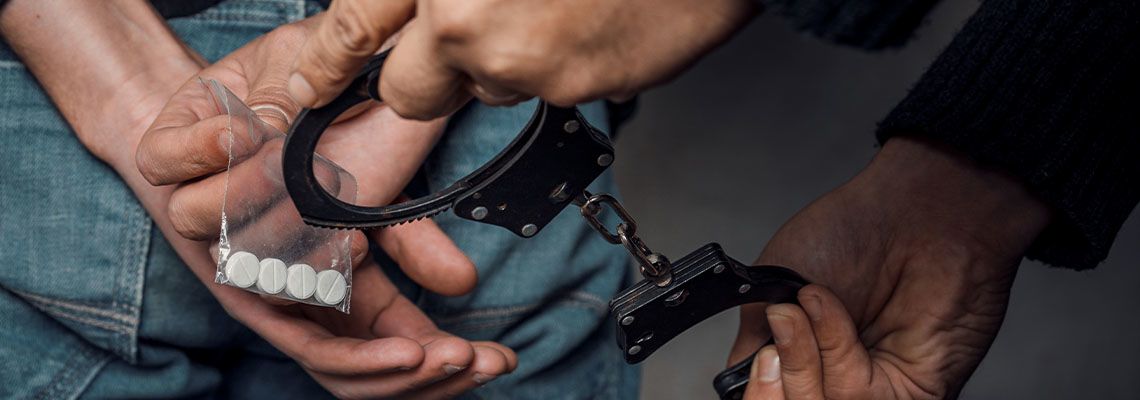When facing the serious issue of drug-related crimes, individuals may feel overwhelmed and unsure of their rights. At the Law Office of Michael D. Litman, PLLC, we understand the challenges that come with such situations and are committed to providing guidance and support.

What Is the Average Sentence for Drug Possession?
Facing drug possession charges can be a daunting experience, leaving you with numerous questions about potential legal consequences. New York has stringent drug possession laws, and understanding them is vital for anyone who may find themselves on the wrong side of the law.
The severity of your charges largely depends on various factors, primarily the quantity of drugs found in your possession and any prior felony convictions on your record. Another main factor is whether you are facing state or federal charges.
Average Sentences for Drug Possession
Understanding the potential sentences for drug possession is crucial when evaluating the consequences you might face. These sentences can vary significantly depending on the nature of the charges, whether they are state or federal, and the specific circumstances of your case:
State Charges: On average, sentences for drug possession on state charges in New York hover around 20 months, which is slightly less than two years.
Federal Charges: In contrast, the average sentence for drug possession on federal charges is approximately 81 months, equating to less than seven years. Federal charges are often more severe due to the nature of federal drug laws.
It's essential to note that these are average sentences, and individual cases can lead to outcomes that vary significantly from these averages. Because of this, it’s essential that you understand New York's drug possession laws, exploring what's legal, what's prohibited, average sentences, degrees of criminal possession, and why securing legal counsel is crucial for your defense.
To understand these laws more and to get a professional criminal defense attorney, reach out to our skilled attorney at the Law Office of Michael D. Litman, PLLC today.
What Drugs are Legal?
In New York, drug possession laws have strict boundaries, but there are instances where possessing drugs is legal. Understanding these exceptions is crucial:
Prescription Medications: Possessing prescription drugs is legal if you have a valid prescription from a licensed healthcare professional. It's essential to ensure that the medication matches the prescription and is used as directed.
Medical Marijuana: New York allows the use of medical marijuana for qualifying conditions. Patients with valid medical marijuana cards can legally possess and use specific cannabis products.
Cannabis for Personal Use: Individuals 21 or older in New York, are allowed to possess and purchase up to 3 ounces of cannabis, and up to 24 grams of concentrated cannabis. Smoking, ingesting and consuming cannabis or concentrated cannabis is also permitted for individuals 21 or older.
What Drugs are Prohibited?
While there are legal avenues for possessing certain drugs in New York, many substances fall under strict prohibition:
Illegal Drugs: Possession of illegal drugs, such as cocaine, heroin, methamphetamine, and ecstasy, is strictly prohibited.
Controlled Substances: Possessing controlled substances without a valid prescription or for non-medical purposes is illegal. Controlled substances include a wide range of drugs, including painkillers like oxycodone, stimulants like Adderall, and sedatives like Xanax.
Drug Paraphernalia: Possession of items associated with drug use, such as pipes, syringes, or scales, can also result in charges, even if no drugs are found.
Degrees of Criminal Possession of a Controlled Substance
New York classifies criminal possession of a controlled substance into degrees, each with distinct penalties. Understanding these degrees and their associated penalties is vital to comprehend the potential legal consequences:
Seventh Degree: This is the least severe degree of possession and is classified as a Class A misdemeanor, carrying a maximum sentence of one year in jail.
Fifth Degree: Possession in the fifth degree is a Class D felony, with a maximum sentence of 4 ½ years.
Fourth Degree: A step up in severity, possession in the fourth degree is a Class C felony, carrying a maximum sentence of 9 years.
Third Degree: Criminal possession in the third degree is a Class B felony, with a maximum sentence of 15 years.
Second Degree: Possession in the second degree is a Class A-II felony, and it comes with a maximum sentence of 17 years.
First Degree: The most severe degree of possession is criminal possession in the first degree, which is classified as a Class A-I felony, carrying a maximum sentence of 25 years to life in prison.
These maximum sentences are significantly higher than the average 20-month sentence. This disparity underscores the critical importance of consulting an experienced criminal defense attorney when facing drug possession charges.
Why You Should Work With an Attorney
If you're facing drug possession charges in New York, you might wonder why it's imperative to seek legal counsel. Here are compelling reasons:
Understanding the Legal Landscape: Drug possession laws are intricate and ever-evolving. A seasoned attorney has an in-depth understanding of these laws and can guide you through the complexities of your case.
Building a Strong Defense: An experienced attorney can investigate your case thoroughly, identify potential weaknesses in the prosecution's evidence, and build a strong defense tailored to your specific circumstances.
Negotiating on Your Behalf: Attorneys are skilled negotiators who can work with prosecutors to potentially reduce charges, secure plea deals, or advocate for alternative sentencing options.
Protecting Your Rights: Your attorney will protect your rights throughout the legal process, preventing any violations that could compromise your case.
Minimizing Consequences: With the right representation, you may have a better chance of achieving a "not guilty" verdict or receiving a minimized sentence. Without legal counsel, you face a higher risk of conviction and harsher penalties.
Helping New York Residents With Attentive Care
Navigating New York's drug possession laws is a complex endeavor, and the potential consequences are significant. Whether you find yourself facing state or federal charges, one thing remains constant: the importance of securing legal representation.
At the Law Office of Michael D. Litman, we've been dedicated to helping White Plains, Westchester County, and New York Metro residents facing drug possession charges since 2014. We have the knowledge, experience, and commitment to guide you through the legal process, from arrest through trial. Contact us today for a consultation at (914) 268-6855, and let us work diligently to protect your rights and advocate for the best possible outcome in your case.
RECENT POSTS
Have you recently been charged with theft? Theft crimes can have serious consequences, but not all theft charges are treated equally under the law. In New York, the distinction between a misdemeanor and a felony theft charge hinges on several key factors.




